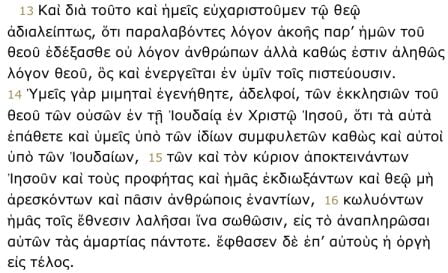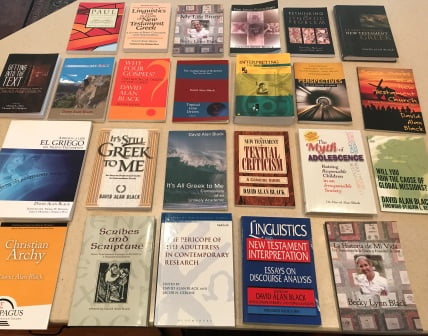(August 16, 2017) 3:38 PM What starts as a few light snow flakes soon becomes a blizzard. That’s how I feel whenever I read and meditate on a passage of Scripture. More and more I am hearing the Lord saying to His church, “Come back to original Christianity.” Friends, we’ve elevated how we do church to such a degree that it takes a professional — in many cases, a professional team — to pull it off. If we’re really going to change the world, the process has to become a whole lot simpler. Everyone has to become a servant.
This thought came to mind as I read Phil. 1:1 this morning. Just as a reminder: My habit is to turn to a passage and read it straight through. Then I go back and work through each clause word by word. After this, I spend time pondering, praying, and journaling. Writing my thoughts down helps focus my attention and allows me time to process. You don’t have to be a C. S. Lewis to do this either. (Thankfully.)
First off, here’s another way of rendering the opening verse of the letter. You’ll notice it differs a bit from the rendering I gave you yesterday. That’s perfectly acceptable. Rarely, if ever, is there only one way to render the Greek into English. The only translation I wouldn’t accept from my students is one that would be impossible in English. “Paul and Timothy, slaves of Christ Jesus, to all the saints in Christ Jesus in Philippi ….” would not past muster if only because we would never begin a letter like that. That’s simply not “English.” We either have to write “Paul and Timothy, slaves of Christ Jesus, write this letter to …” or something like this:
This letter is from Paul and Timothy, slaves of Christ Jesus. It is for all God’s people in Philippi who are in union with Christ Jesus, including those who oversee and serve.
You may have noticed that my “including those who oversee and serve” is ambiguous, and intentionally so. Paul may be referring to two groups of people here (overseers and servers) or, by employing a figure of speech called hendiadys (Greek for “one-through-two,” that is, one idea expressed through two words) he’s referring to a single group: overseers who serve. In New Testament times, an overseer was someone who “looked after” or “cared for” someone else. Another sense was that of “visiting” someone to check to see how they were doing. The term always carried with it an overtone of love and affection. My daughter, for example, acted like an overseer today when she brought me some homemade soup. This was an act of “overseeing” (episkope) on her part: “oversight that naturally goes on to provide the care and attention appropriate to the ‘personal visitation’” (Strong’s Concordance).
Here Paul seems to be using the term “overseers” more narrowly, that is, as a reference to church leaders, and indeed, “leaders” would also be an acceptable rendering. Who, then, are the servers? In one sense, all Christians alike are servers (diakonoi). In fact, from reading the book of Ephesians, we know that one of the main responsibilities of overseers is to “equip God’s people for works of service” (Eph. 4:11-12). The term “servers” itself takes its name from those in the secular world who were responsible for such functions as the distribution of food and gifts. When Paul uses the term here, he’s probably referring to people in the church who were especially gifted in ministering to the physical and material needs of the congregation or were involved in supervising such ministries.
When, then, of our old friend Mr. Hendiadys? I think he’s still in play here. The Greek allows it, and so does the context. We’ve already noted that Paul and Timothy are explicitly referred to as men who serve Christ Jesus. Likewise, overseers/leaders in the church don’t simply possess a status in the body of Christ. They are those who serve others by attending to their needs. They “care for God’s flock with all the diligence of a shepherd” (1 Pet. 5:2, The Message).
So this was the text I meditated on this morning. In the silence, God spoke to me as clearly as if He were sitting next me. “Dave, are you a genuine servant of Christ Jesus? Is that what people know you for? Or do you just talk about performing the duties of a slave in the service of God and His people? Could you write, ‘Dave, a slave of Christ Jesus’?” We all need to become saints who serve. I do. You do. The church and the world desperately need this. The only person we can orient our life around is Jesus and His example of utter self-abnegation. Under His leadership, we are freed from self. We are free to recede into the group. We are free to serve others, no matter if it’s on a job site or if it’s in delivering soup to a sick and home-bound loved one. We are free to live with intention and purpose. To serve the Lord is our calling. It is our work. It is our vocation, all of us helping out in our preaching, our teaching, our labor, our play, in all the zillions of small ways our imperfect candles can shine. Let’s make a transition to the model of Christianity Paul is setting forth for us in Philippians. This is the heart message of the letter: allowing God to develop the selfless mind of Christ in us so that we can bear God’s image in our attitudes and actions both in the church and in the world.
This side of heaven there is nothing sweeter than communing with our Creator, whether in nature or in His word. Let’s become the careful listeners He seeks. Paul’s overriding concern in Philippians is the advance of the Gospel. Since this is the case, it seems obvious that we should read the letter — including its opening salutation — as explicitly paradigmatic. It’s all well and good to point out a “nominative absolute” or a “dative of address” or a “genitive of possession” here and there, but such observations simply don’t go far enough. In fact, I’d say that stopping there without considering the paradigmatic force of such constructions is to do a grave disservice to the Greek student since it implies that Greek exists for itself and not as a foundation for life-changing truth. What is being modeled in Philippians, even in the very first paragraph, is the need to live a “cruciform” life — a mind in keeping with the Gospel. “Don’t do anything out of selfish ambition or vain conceit, but in humility consider others better than yourselves” (2:3). By elevating Timothy’s name to the same level as his own, Paul is doing exactly that. And what united Paul and Timothy was nothing less than their mutual participation in the Gospel. This is what makes Paul’s admonition to Euodia and Syntyche in 4:2 all the more poignant. These women had at one time contended side by side with Paul in the cause of the Gospel, but now they needed to be entreated to agree with each other in the Lord. Paul seems to be saying that every one of us in the church needs to have the same mindset, despite our many differences. The propagation of the Gospel ever and always hangs on a unified church. But for this to happen we must sacrificially give ourselves for the sake of others, because this is what the Gospel is all about. To miss this central message in Phil. 1:1 is to miss the letter altogether and to miss the very heart of what it means to be a Christian. The Spirit never sows division and pride. The best, most joyful, and most genuine Christians I know are those who gladly serve others as slaves of Christ Jesus. Seeing this great truth being played out in the opening verse of Philippians makes the study of the Greek text all the more beautiful for me.





